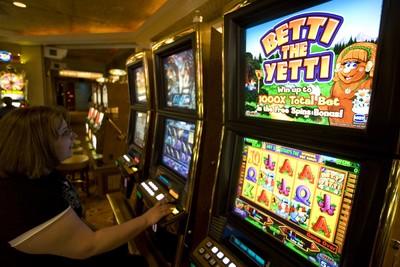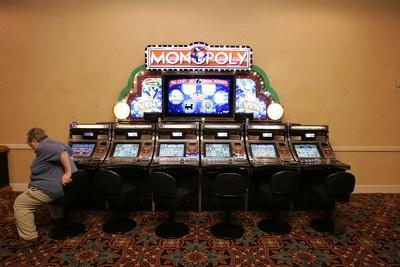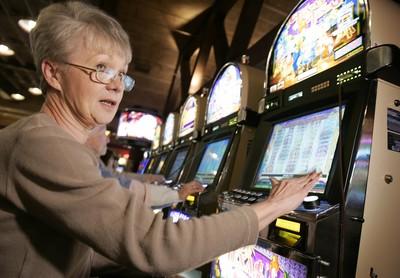FUTURE IS SERVED



Despite nearly a half-decade of development and millions of dollars invested in research and testing, slot machine manufacturers are still a few years away from bringing server-based gaming — often referred to as downloadable technology — to casino floors.
Wall Street has viewed the technology, which could let casino operators better manage their slot machine area and have greater flexibility in what they can offer customers, as the next wave in gambling.
Conceivably, downloadable technology would allow casino managers to change a slot machine’s games, denominations, bonus payouts and promotions from a central computer server rather than requiring technicians to perform the work manually.
Investors believe equipment makers will harvest a financial windfall from a cycle in which older games are supplanted by newer models. Profits could be similar to the monetary heyday the manufacturers experienced earlier in the decade when cashless gaming — ticket in-ticket out technology — energized a mass replacement of slot machines and fueled record earnings and chart-topping stock prices for game providers.
“Although general concerns remain with respect to the timing of server-based gaming, as well as the industry’s commitment to it, we believe that it is both on track and is well embraced,” Deutsche Bank gaming analyst Bill Lerner said in an April 12 note to investors.
He said Nevada gaming authorities have established regulations and testing protocols that could bring the products to market more quickly than in any other jurisdiction.
“The industry is on track for widespread server-based gaming implementation in 2009, and likely contributing materially to earnings of gaming equipment supplies beginning in mid-2008 as the replacement cycle heats up,” Lerner said.
Many equipment makers are spending heavily in research and development for server-based gaming products, hoping for a significant return on their investment, industry analysts said.
Slot machine giant International Game Technology, which has a market share of more than 60 percent of all the casino floors nationwide, averages close to $50 million a quarter in research and development costs. WMS Industries said it spent $49 million last year in the same area, while Bally Technologies’ research expenditures have grown from $36.6 million in 2004 to $45.1 million in 2006.
Representatives of the slot machine manufacturers said the companies don’t break out the percentage of the dollars spent on server-based gaming initiatives, but it is the primary item for development budgets.
“It’s really a continuation of the increased automation of the casino floor that began in the late 1990s,” said Patrick Cavanaugh, who oversees investor relations for IGT. “A belief in the future of sever-based gaming is the major reason for anybody who buys our stock and is holding on to it for the long term.”
WMS Industries’ investor relations spokesman Bill Pfund said server-based gaming is the company’s primary focus for product research.
“We’ll probably up the figure that we spend on R and D this year,” Pfund said. “Server-based initiatives will be a goodly portion of that amount.”
Gaming analysts said the casino industry remains interested in server-based gaming but are unsure how much slot machine floor space they’ll give the games. During its annual survey of slot-floor managers, Wall Street investment firm Goldman Sachs found that casino operators are only willing to initially devote about a quarter of their slot floor to the new machines.
One question, it seems, is security.
“Security risks and technology problems have been steadily declining as concerns for downloadable gaming,” wrote analyst Steven Kent in the March 5 survey for Goldman Sachs. He said a rising worry among slot managers is that customers may not accept the technology.
Kent thought that companies such as IGT must more aggressively sell the product’s benefits. Many analysts see IGT as well ahead of other manufacturers in developing server-based machines.
“IGT needs to explain why customers will want downloadable,” Kent wrote. “IGT has not yet fully showcased the true front-end game applications associated with downloadable. Right now, IGT is mainly focused on testing the technology and game architecture. We expect that, over the next year, as IGT shows all the capabilities of downloadable, its applications to the consumer will become clearer.”
Prudential Equity Group gaming analyst Joel Simkins found during meetings with representatives of the major casino operators that there is not a clear understanding as to what sever-based gaming will offer.
“IGT and other suppliers will need to do a better job of communicating not only the top-line benefits of new technology, but also the cost saving opportunities,” Simkins said in a note to investors. “During our meeting with MGM Mirage management, (company executives) indicated (the company) is in no rush to deploy server-based technology currently, particularly given its relatively recent and significant investment in ticket in-ticket out technology. While MGM Mirage management could be posturing, we think this is significant given that this is one of IGT’s most important customers.”
Slot makers have been unveiling some server-based gaming concepts in the market, but not the complete system.
IGT began testing the technology last year, initially at the Barona Valley Ranch in San Diego and Treasure Island. Other prototypes of the company’s server-based slot machines are in tests at MGM Grand Detroit and at Ameristar St. Charles, outside St. Louis.
Cavanaugh said customers at those casinos, however, have little idea they are testing potentially ground-breaking slot machine advancements. The slots look and function like any other IGT game. The company is testing the product’s behind-the-scenes capabilities.
“Through this year and next, we’re on track to continue to work on our core technologies,” Cavanaugh said. “We have a robust set of applications under development and what is being tested is the core functionality of the system. We’re taking the broadest, most wholesale view in the operational aspects of the product.”
Illinois-based WMS uses server-based technology in the company’s widely distributed Monopoly Big Event slot machine game. The bonusing feature is operated off a central server.
WMS Chief Operating Officer Orrin Edidin said the server-based products for all equipment makers will have similar administrative and accounting functions. He said the key is to show casino operators that players are ready to embrace the new technology.
“We’re a game content company and we need to develop the content that will produce the highest-earning games on the casino floor,” Edidin said. “That’s why we took an approach to focus on the customer. We don’t want to overwhelm the player’s experience, but we want to give them a sample of the product. We think Big Event is a good example of the kind of game content operators and players can expect to see facilitated by server-based gaming.”
Bally Technologies is expected to begin testing its first server-based slot machine system at a Southern California Indian casino this summer.
“Everyone is grasping at the functionality of the system,” said Jeff Allen, Bally’s director of business development. “We don’t want to do anything that takes away from a player’s ultimate gaming experience.”
Nevada Gaming Control Board member Mark Clayton said the casino operators he has spoken with are concerned about the initial flood of products that could invade the market.
In addition to the leading American slot makers, new companies are looking to enter the picture. Cyberview Technology, which is headquartered in London and provides server-based gaming products to casinos in Europe, has applied for a Nevada gaming license.
Clayton said the casinos want the servers and slot machines of different companies to be able to communicate with each other.
“The biggest area of concern is that there will be five different servers for five different sets of slots,” said Clayton, who has purview over the control board’s steering committee that is working on implementing the technology in Nevada casinos. “The operators seem to want to have one server that would take care of all the server-based machines regardless of company, and that seems to be the direction we’re headed.”
Clayton said regulations for numerous applications, such as how and when to change out a game through the central server, have been written and are ready to apply. For example, casino operators are only able to change out features such as games, pay tables or bonuses when a machine has been idle for four straight minutes.
Clayton doesn’t believe casinos will be in a mad rush to inundate their floors with overwhelming technology.
“The operators were excited initially about the potential, but there seems to be a scaling back of expectations,” Clayton said.
“It seems there will be more of a baby-step approach to the implementation. It will take time for the technology to evolve,” he said.












